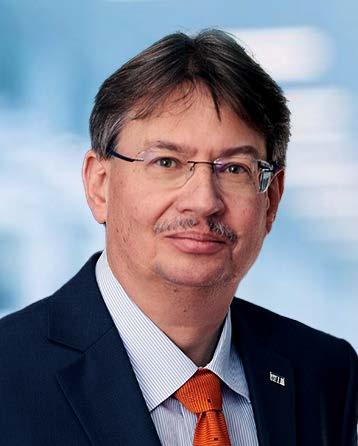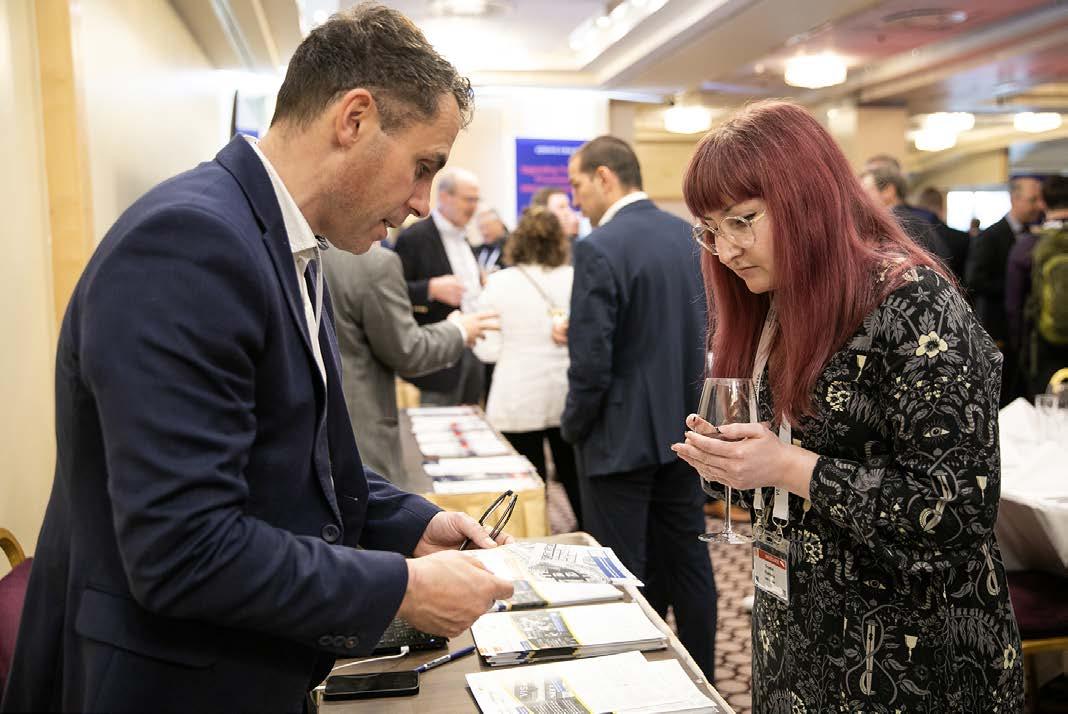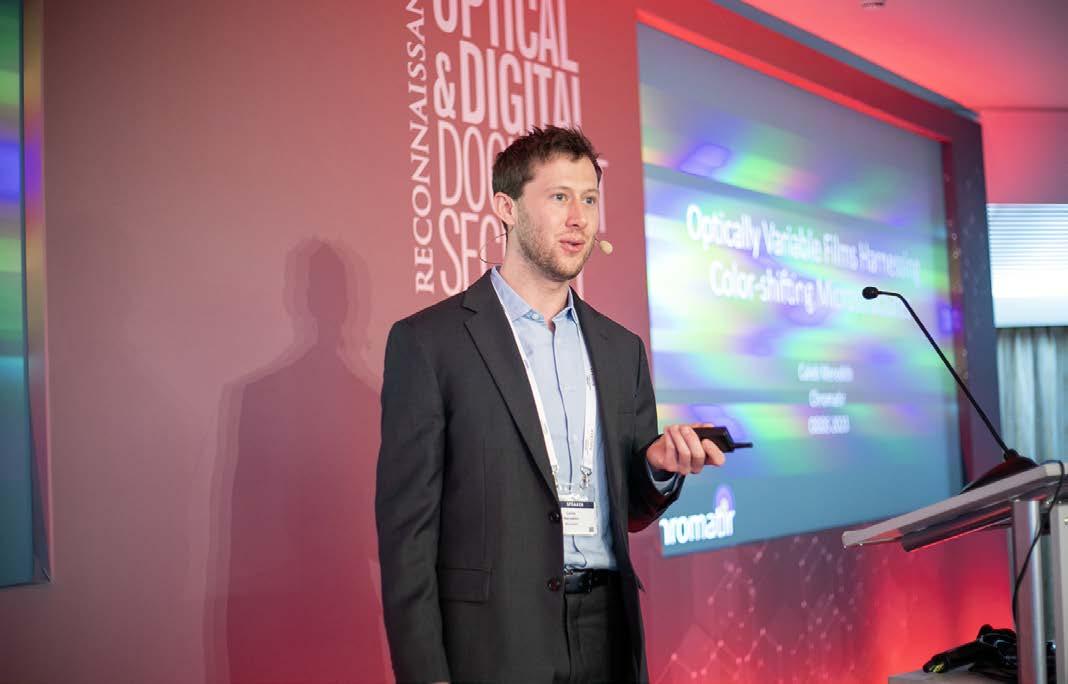Monday 8 April

About Prof. Dr Volker Lohweg
Prof. Dr Volker Lohweg is the head of the research group ‘Discrete Systems’ and Director of the inIT-Institute Industrial IT. The research group’s working area is dedicated to Cognitive Systems in automation especially Information Fusion and Optical Document Security, including banknote inspection and authentication. He is active in SPIE and IEEE as a reviewer in the field of image processing and data analysis. His interests are sensory conflict modeling and Multi-Scale signal analysis in the context of optical and digital document security.

About Dr Anke Ginter
Anke Ginter is a Senior Innovations Developer at Bundesdruckerei GmbH in Germany. She works on quantum computing and quantum communication systems with special focus on usability and security. Anke Ginter studied physics and made her dissertation in quantum optics analysing interaction processes between movable colloidal quantum dots.


Artificial Intelligence and Quantum Computing: GameChangers for Document Security?
13:30 – 17:00
This seminar explains the current developments in two areas of computing which could have a significant impact on identity and transaction security: artificial intelligence and quantum computing.
The seminar is in three parts: Dr Volker Lohweg will give an overview of AI; Dr Anke Ginter will then explain quantum computing, and Ian Lancaster will pull this together and consider the implications for optical and digital document security.
An Introduction to Artificial Intelligence
Artificial intelligence is much talked about and read about, but what is actually behind it? What types of AI are there and what applications are possible?
Apart from ethical and cultural considerations, there are numerous challenges and hurdles in the use of AI. It is necessary to integrate AI methods into existing systems and structures and, in some cases, to reorganise responsibilities and processes.
In this short survey of AI, Volker will explain the differences between human intelligence and artificial intelligence, then take a look at the history and consider what AI can do today. He will also explain how such systems are trained and what impact this has on us in the application. He will conclude with a discussion of examples from image processing and the design of documents, pointing out the possibilities for use, but also explain the current dangers, such as deep fakes, before glancing at the future prospects for AI
Quantum Computing and its Impact on Security
Increasing performance and algorithmic realizations of Quantum computing devices bring the quantum threat closer to current ID systems and documents. Even if experts disagree when and how this will be manifested, the effects of such threat are far-reaching. Moreover, the development of quantum computing demonstrated how quickly disruptive technologies can emerge and question security considerations. This is the reason why reactions and adaptions should be done as soon as possible. Post-quantum security and crypto agility can be viewed as the first step on the way to a secure quantum era.
In this seminar, we will give an overview of the current state of quantum computing devices to get a deeper understanding of the technology. Furthermore, we illustrate how quantum computing, quantum communication and security work together and should be regarded as a unit to see the whole picture and react appropriately.
The Implications…
So what does this mean for our field of document security? What are the implications for our digital or virtual identities and our online transactions, whether checking our bank account or buying from Amazon? How does this impact the physical documents we carry: our IDs and banknotes? Do they need to change, adapt, interact more with the online world?
Ian Lancaster will lead this part of the seminar, pulling together what we have learned and facilitating a discussion of what it means for this field.
Tuesday 9 April
Conference Welcome
Welcome & Introduction
Ian Lancaster, Reconnaissance International (UK)
KEYNOTE: AI-driven Counterfeits: the Possibilities and How to Fight Them
Jordan Brough, Homeland Security Investigations Forensic Laboratory
Session 1:
Phygital: The Link Between the Physical and Digital Worlds
Artefactometry by Artificial Intelligence for Marked Objects
Zbigniew Sagan, Advanced Track & Trace (France)
Digital Product Passports – unintended consequences for digital ID?
Alan Hodgson, Alan Hodgson Consulting (UK)
Simple and Cost-Effective Phygital Solutions
Gabor Zsámboki, ANY Security printing (Hungary)
Session 2:
Phygital Approaches to Document Security
Optically Variable Devices On Secure Documents - Where Next?
Francis Tuffy, Reconnaissance International (UK)
Strategies For A Standardisation Of PPE Certificates
Volker Lohweg, INiT (Germany)
Taggant-Based Holographic Track and Trace Labels for Liquor
Sajan Ambadiyil, Centre for Development of Imaging Technology (India)
Stealth Spectral Landmarks for Complex Objects’ Authentication
Marc Pic, Advanced Track & Trace (France)
Session 3:
New Approaches to Document Security
Think Quantum - A New Perspective on Security
Anke Ginter, Bundesdruckerei (Germany)
30 international speakers
Behind the Barcode – Multi-Layered Functional Barcodes for Security Documents
Tom Mitchell, Luminescence Sun Chemical (UK)
An OVD Secured By Design
Jeremy Malinge, Crime Science Technology (France)
Development of Innovative Machine-Readable Luminescent Features
Scott Haubrich, SICPA (Switzerland)
Aldric Molina, Laboratory Manager Machine-Readable Features
Secure and Trusted Identification Interactions in The Digital Sphere
Jérémy Chmiela, IDEMIA (France)
Session 4:
Protecting Identity in the Digital Age I
Protecting IDs In The Quantum Computing Era
Alexander WInnen, Veridos (Germany)
Leveraging In-Brain Identity Validation Mechanisms for Detection of Live Video Deepfake Attacks
Hendrik Graupner, Bundesdruckerei (Germany)
Transforming an Identity Management System
Aftab Baloch, FTO/FBR (Pakistan)
Color-Tunable Photonic Crystals: Dynamic or Serial coded? You decide!
Heeyeon Kim, NanoBrick (South Korea)
Session 5:
Protecting Identity in the Digital Age II
What Will Passports Look Like in 20 Years?
Renaud Laffont-Leenhart, Thales (France)
Enabling Citizen Protection with Seamless and Secure Digital Identity Wallets
Jorge Carvalho, State Printing House (Austria)
Security Challenges of Mobile IDs
Frank Schmalz, Veridos (Germany)
Protection Through Personalized ‘Watermark-Like’ Features
Roger Bollström, MOZAIQ (Switzerland)
Session 6:
New Optical Techniques for Security I
Modern Optical Features for ID Documents - A Review
Yit-shun Leung Ki, Security Identity Alliance
Utilizing Two-Colour Colourshifts For Highest Security
Sebastian Mader, OVD Kinegram (Switzerland)
Special Information Encryption for Optical Lithography Technology
Chao Sun, Wuhan Huagong Image Technology (China)
Panel Discussion
ID and Document Security in the Face of AI And Quantum Computing
Session 7:
New Optical Techniques for Security II
Security Features Based on Light Field Shaping with Freeform Micro-Structure
Dr Dong Yang, ZSST (CBPM Group) (China)
Brilliantly Innovative: A New Security Feature
Using Micro-Optical Free-Form Elements
Martin Egginger, Hueck Folien (Austria)
Print Document Protection: A ComputerGenerated Holography Solution
Leehwan Hwang, Kwangoon University (South Korea)
Particle-Based Colour Change Security Feature
Michael Natan, Diametryx (USA)
Development of Novel Overt Security Feature for ID Documents
Keitaro Sugihara & Yoshiyuki Mizuguchi, Toppan Digital (Japan)
The Committee
Chairman: Ian Lancaster, Reconnaissance International (UK)
Paul Dunn, Optical Security Consultant (UK)
Jörg Fischer, Bundesdruckerei (Germany)
Franziska Granc, Nimbus Technologieberatung (Germany)
Alan Hodgson, Alan Hodgson Consulting (UK)
Sun Kai, China Banknote Printing & Minting Corp (China)
Renaud Laffont-Leenhardt, Thales (France)
Volker Lohweg, InIT (Germany)
Josh Marmol, G.E.T Secure (USA)
Jean-Baptiste Milan, HID Global (USA)
Marc Pic, Surys (France)
Tony Poole, Document Security Alliance (USA)
Mikihiko Sakakibara, Seculysis (Japan)
For the latest times and additions to the programme, visit
opticaldigitalsecurity.com
Johannes Schaede, Orell Füssli (Switzerland)
Harald Walter, OVD Kinegram (Switzerland)
Yaohua Wang, Security Identity Union (China)
10 April
Wednesday
Useful Information
Registration
To be part of Optical & Digital Document Security™ 2024, click here to book online.
Pre-conference Seminars
Add either or both of the pre-conference seminars to your booking – European Wonder Wallet and/or Artifical Intelligence and Quantum Computing.
Fees
£1,300*/£1,450 Delegate
£1,000*/£1,100 Presenter Delegate
£ 900*/£1,000 Academic**
£200 Social partner
Pre-Conference Seminars
£ 590
One seminar
£ 790 Two seminars
Sponsorship and Exhibitor Opportunities
Conference dinner: £6,000
App & Handbook: £3,000
Welcome reception: £2,400
Proceedings: £1,500
Coffee-refreshment-lunch breaks over 2 days: one day £3,100 / two days £6,200
Farewell Drinks: £2,400
Lanyards & Badges: £2,400 SOLD
Contact Samantha Burns for more information: sam@recon-intl.com
Reserve Your Table-Top Exhibition
£655*/£730
Optical & Digital Document Security includes an informal topical exhibit for hands-on demonstrations of the latest security technologies. All presenters may reserve a table to show examples illustrating their paper.
Non-presenters are also welcome to show their security products and systems to this specialist and decision-making group, contact sam@recon-intl.com
“An interesting and thought provoking conference, bringing together many technologies and perspectives, united by digital security.”
Luminescence SunChemical Security
Venue
Lisbon Marriott Hotel places travelers near many of Lisbon’s top attractions. Centrally located, we are close to the city’s historic monuments and museums, Bairro Alto, lively football stadiums, sunny beaches and Lisbon Airport.
The reservation link for the discounted Reconnaissance rate at the venue hotel will be sent to all delegates.
Please ignore any unsolicited offers.
Conference Dinner and Exhibition
On the evening of Tuesday 9 April we will be holding a tabletop exhibition and buffet dinner. This informal setting is the perfect opportunity for delegates to see, handle and discuss in detail what is happening in this field.
The exhibition and dinner is an excellent opportunity for meeting and learning more about your fellow delegates. It is an occasion for all conference participants to show their results in an informal ambience and will be a very lively event!
Here to Help
If you have any questions about the conference, contact the conference team:
Weronika Komorowska, Conference Manager
Alison Bell, Conference Executive
Tel: +44 (0)1932 785 680
Email: events@recon-intl.com
Other Information
Your Conference Organiser: The event is organised by Reconnaissance International, the leading source of business intelligence for authentication, identity, security printing and holography. Visit www.reconnaissance.net
Release: We reserve the right to cancel, modify or postpone the event without prior notice and to refuse admission to any person (with payments refunded).
Terms and Conditions: Visit www.reconnaissance.net/terms for full terms.
Conference Languages
The conference will be conducted in English.
* Ends 29 February 2024
** Academic rate applies to delegates from universities or other educational establishments

RECONNAISSANCE INTERNATIONAL
Tel: +44 (0)1932 785 680
Email: events@recon-intl.com
www.reconnaissance.net





















